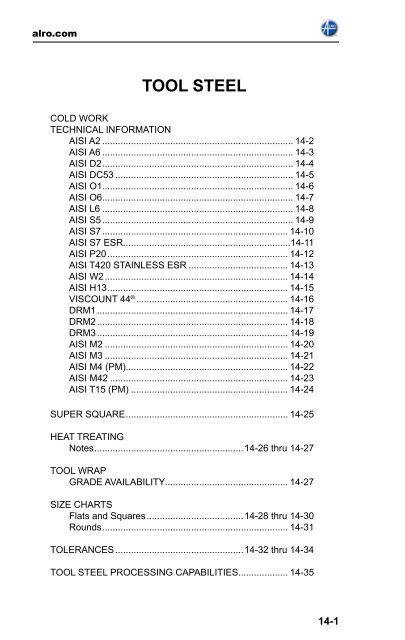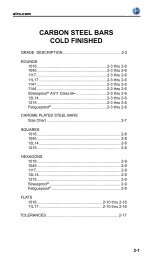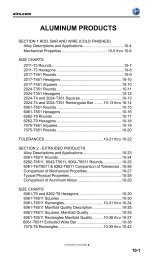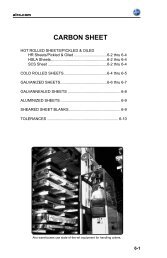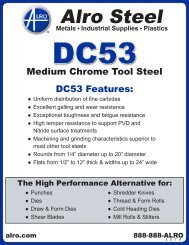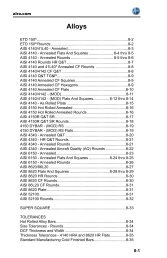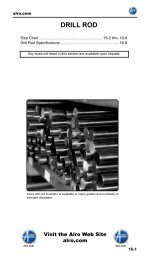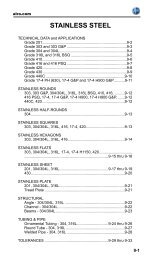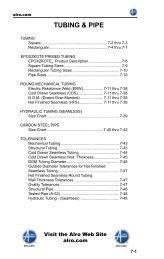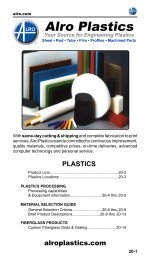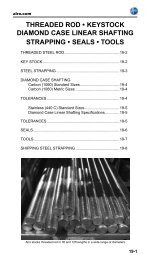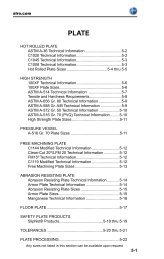You also want an ePaper? Increase the reach of your titles
YUMPU automatically turns print PDFs into web optimized ePapers that Google loves.
<strong>TOOL</strong> <strong>STEEL</strong><br />
COLD WORK<br />
TECHNICAL INFORMATION<br />
AISI A2.......................................................................... 14-2<br />
AISI A6.......................................................................... 14-3<br />
AISI D2.......................................................................... 14-4<br />
AISI DC53..................................................................... 14-5<br />
AISI O1......................................................................... 14-6<br />
AISI O6......................................................................... 14-7<br />
AISI L6.......................................................................... 14-8<br />
AISI S5.......................................................................... 14-9<br />
AISI S7........................................................................ 14-10<br />
AISI S7 ESR................................................................14-11<br />
AISI P20...................................................................... 14-12<br />
AISI T420 STAINLESS ESR....................................... 14-13<br />
AISI W2....................................................................... 14-14<br />
AISI H13...................................................................... 14-15<br />
VISCOUNT 44 ® ........................................................... 14-16<br />
DRM1.......................................................................... 14-17<br />
DRM2.......................................................................... 14-18<br />
DRM3.......................................................................... 14-19<br />
AISI M2....................................................................... 14-20<br />
AISI M3....................................................................... 14-21<br />
AISI M4 (PM)............................................................... 14-22<br />
AISI M42..................................................................... 14-23<br />
AISI T15 (PM)............................................................. 14-24<br />
SUPER SQUARE............................................................... 14-25<br />
HEAT TREATING<br />
Notes..........................................................14-26 thru 14-27<br />
<strong>TOOL</strong> WRAP<br />
GRADE AVAILABILITY............................................... 14-27<br />
SIZE CHARTS<br />
Flats and Squares......................................14-28 thru 14-30<br />
Rounds........................................................................ 14-31<br />
TOLERANCES..................................................14-32 thru 14-34<br />
<strong>TOOL</strong> <strong>STEEL</strong> PROCESSING CAPABILITIES................... 14-35<br />
14-1
AISI A2<br />
An air-hardening tool steel containing five percent chromium. Replaces the oil<br />
harden ing (O1 type) when safer hardening, less distortion and increased wearresistance<br />
are required. Provides an intermediate grade between the oil hardening<br />
and the high carbon, high chromium (D2) types.<br />
TYPICAL APPLICATIONS<br />
Large Blanking Dies, Thread Roller Dies, Long Punches, Rolls, Master Hubs,<br />
Trim ming Dies, Forming Dies, Precision Tools, Gauges, Coining Dies, Extrusion<br />
Dies, Mandrels, Shear Blades and Slitters.<br />
TYPICAL ANALYSIS TYPE A2 (UNS T30102)<br />
Carbon (C) .95/1.05<br />
Manganese (Mn)<br />
1.00 max<br />
Silicon (Si)<br />
.50 max<br />
Tungsten (W)<br />
Molybdenum (Mo) .90/1.40<br />
Chromium (Cr) 4.75/5.50<br />
Vanadium (V) .15/.50<br />
*Nickel (Ni)<br />
.30 max<br />
FORGING (a)<br />
Start forging at<br />
1850-2000°F<br />
(1010-1093°C)<br />
Do not forge below<br />
1650°F (899°C)<br />
NORMALIZING (b)<br />
Do not normalize<br />
ANNEALING (c)<br />
Temperature<br />
1550-1600°F<br />
(843-871°C)<br />
Rate of cooling, max. per hour<br />
40°F (22°C)<br />
Typical annealed hardness, Brinell 201-235<br />
HARDENING<br />
Rate of heating<br />
Slowly<br />
Preheat temperature<br />
1450 °F (788°C)<br />
Hardening temperature<br />
1700-1800°F<br />
(927-962°C)<br />
Time at temperature, minutes<br />
20-45 (j)<br />
Quenching medium<br />
A (I)<br />
TEMPERING<br />
Tempering temperature<br />
350-1000°F<br />
(177-538°C)<br />
Approx. tempered hardness, Rockwell C 57-62<br />
WEAR RESISTANCE<br />
High<br />
TOUGHNESS<br />
Medium<br />
RESISTANCE TO SOFTENING EFFECT OF<br />
ELEVATED TEMPERATURE<br />
Medium to High<br />
DEPTH OF HARDENING<br />
Deep<br />
MACHINABILITY<br />
Medium<br />
GRINDABILITY<br />
Medium<br />
DISTORTION IN HEAT TREATING<br />
Lowest<br />
SAFETY IN HARDENING<br />
Highest<br />
RESISTANCE TO DECARBURIZATION<br />
Medium<br />
• Refer to pp. 14-26 thru 14-27 for notes (a) to (o) incl., explanation of letter 0, A, S, B and W.<br />
* Unless otherwise specified, nickel plus copper equal 0.75% max. for all tool steel types.<br />
DCF<br />
14-2
AISI A6<br />
A6 is an air-hardening, non-deforming tool steel that combines the deep hardening<br />
characteristics of air-hardening steels with the simplicity of low temperature heat<br />
treatment possible in many of the oil-hardening grades.<br />
TYPICAL APPLICATIONS<br />
Blanking Dies, Precision Tools, Forming Dies, Coining Dies, Master Hubs, Shear<br />
Blades, Plastic Molds, Spindles, Mandrels, Heavy Duty Punches.<br />
TYPICAL ANALYSIS TYPE A6 (UNS T30106)<br />
Carbon (C) .65/.75<br />
Manganese (Mn) 1.80/2.50<br />
Silicon (Si)<br />
.50 max<br />
Tungsten (W)<br />
Molybdenum (Mo) .90/1.40<br />
Chromium (Cr) .90/1.20<br />
Vanadium (V)<br />
Cobalt (Co)<br />
*Nickel (Ni)<br />
.30 max<br />
FORGING (a)<br />
Start forging at<br />
1900-2050°F<br />
(1038-1213°C)<br />
Do not forge below<br />
1600°F (871°C)<br />
NORMALIZING (b)<br />
Do not normalize<br />
ANNEALING (c)<br />
Temperature<br />
1350-1375°F<br />
(732-746°C)<br />
Rate of cooling, max. per hour<br />
25°F (14°C)<br />
Typical annealed hardness, Brinell 217-248<br />
HARDENING<br />
Rate of heating<br />
Slowly<br />
Preheat temperature<br />
1200°F (649°C)<br />
Hardening temperature<br />
1525-1600°F<br />
(829-871°C)<br />
Time at temperature, minutes<br />
20-45 (j)<br />
Quenching medium<br />
A (I)<br />
TEMPERING<br />
Tempering temperature<br />
300-800°F<br />
(149-427°C)<br />
Approx. tempered hardness, Rockwell C 54-60<br />
WEAR RESISTANCE<br />
Low to Medium<br />
TOUGHNESS<br />
Medium to High<br />
RESISTANCE TO SOFTENING EFFECT OF<br />
ELEVATED TEMPERATURE<br />
Medium<br />
DEPTH OF HARDENING<br />
Deep<br />
MACHINABILITY<br />
Low to Medium<br />
GRINDABILITY<br />
Medium<br />
DISTORTION IN HEAT TREATING<br />
Lowest<br />
SAFETY IN HARDENING<br />
Highest<br />
RESISTANCE TO DECARBURIZATION<br />
Medium to High<br />
• Refer to pp. 14-26 thru 14-27 for notes (a) to (o) incl., explanation of letter 0, A, S, B and W..<br />
* Unless otherwise specified, nickel plus copper equal 0.75% max. for all tool steel types.<br />
14-3
AISI D2<br />
D2 is an air-hardening, high carbon, high chromium tool steel with extremely high<br />
wear resisting properties. It is a very deep hardening steel and will be prac tically free<br />
from size change after proper treatment. The high percentage of chromium gives it<br />
mild corrosion-resisting properties in the hardened condition.<br />
TYPICAL APPLICATIONS<br />
Blanking Dies, Forming Dies, Coining Dies, Slitting Cutters, Heading Tools, Long<br />
Punches, Forming Rolls, Edging Rolls, Master Tools, Beading Rolls, Intricate Punches,<br />
Extrusion Dies, Drawing Dies, Lamination Dies, Thread Rolling Dies, Shear<br />
Blades, Burnishing Tools, Gauges, Knurls, Wear Parts.<br />
TYPICAL ANALYSIS TYPE D2 (UNS T30402)<br />
Carbon (C) 1.40/1.60<br />
Manganese (Mn)<br />
.60 max<br />
Silicon (Si)<br />
.60 max<br />
Tungsten (W)<br />
Molybdenum (Mo) .70/1.20<br />
Chromium (Cr) 11.00/13.00<br />
Vanadium (V)<br />
1.10 max<br />
Cobalt (Co)<br />
1.00 max<br />
*Nickel (Ni)<br />
.30 max<br />
FORGING (a)<br />
Start forging at<br />
1850-2000°F<br />
(1010-1093°C)<br />
Do not forge below<br />
1700°F (927°C)<br />
NORMALIZING (b)<br />
Do not normalize<br />
ANNEALING (c)<br />
Temperature<br />
1600-1650°F<br />
(871-899°C)<br />
Rate of cooling, max. per hour<br />
40°F (22°C)<br />
Typical annealed hardness, Brinell 217-255<br />
HARDENING<br />
Rate of heating<br />
Very Slowly<br />
Preheat temperature<br />
1500°F (816°C)<br />
Hardening temperature<br />
1800-1875°F<br />
(982-1024°C)<br />
Time at temperature, minutes<br />
15-45 (j)<br />
Quenching medium<br />
A (I)<br />
TEMPERING<br />
Tempering temperature<br />
400-1000°F<br />
(204-538°C)<br />
Approx. tempered hardness, Rockwell C 54-61<br />
WEAR RESISTANCE<br />
High to Very High<br />
TOUGHNESS<br />
Low<br />
RESISTANCE TO SOFTENING EFFECT OF<br />
ELEVATED TEMPERATURE<br />
Medium to High<br />
DEPTH OF HARDENING<br />
Deep<br />
MACHINABILITY<br />
Low<br />
GRINDABILITY<br />
Low<br />
DISTORTION IN HEAT TREATING<br />
Lowest<br />
SAFETY IN HARDENING<br />
Highest<br />
RESISTANCE TO DECARBURIZATION<br />
Medium<br />
• Refer to pp. 14-26 thru 14-27 for notes (a) to (o) incl., explanation of letter 0, A, S, B and W.<br />
* Unless otherwise specified, nickel plus copper equal 0.75% max. for all tool steel types.<br />
14-4
DC53<br />
DC53 is a general purpose, cold work die and mold steel whose strength and<br />
toughness approach those of high-speed steels.<br />
TYPICAL APPLICATIONS<br />
Forming Dies, Thread Rolling Dies, Cold Forging Dies, Gauges, Plastic Molds,<br />
Stepped Punch and Press Punching Dies.<br />
TYPICAL ANALYSIS<br />
TYPE DC53<br />
Carbon (C) .95<br />
Molybdenum (Mo) 2.00<br />
Chromium (Cr) 8.00<br />
Vanadium (V) .25<br />
Cobalt (Co)<br />
*Nickel (Ni)<br />
FORGING (a)<br />
Start forging at 1100°C<br />
Do not forge below 900°C<br />
NORMALIZING (b)<br />
ANNEALING (c)<br />
Temperature 830°C - 880°C<br />
Rate of cooling, max. per hour<br />
40°F (22°C)<br />
Typical annealed hardness, Brinell 255°<br />
HARDENING<br />
Rate of heating<br />
Slowly<br />
Preheat temperature<br />
800°C - 850°C)<br />
Hardening temperature 1020° C - 1040°C<br />
Time at temperature, minutes 15 - 45<br />
Quenching medium<br />
Air, Gas<br />
TEMPERING<br />
Tempering temperature<br />
520-550°C<br />
Approx. tempered hardness, Rockwell C 64-58<br />
WEAR RESISTANCE<br />
High to Very High<br />
TOUGHNESS<br />
High<br />
RESISTANCE TO SOFTENING EFFECT OF<br />
ELEVATED TEMPERATURE<br />
High<br />
DEPTH OF HARDENING<br />
Through Harden<br />
MACHINABILITY<br />
High<br />
GRINDABILITY<br />
High<br />
DISTORTION IN HEAT TREATING<br />
Low<br />
SAFETY IN HARDENING<br />
High<br />
RESISTANCE TO DECARBURIZATION<br />
High<br />
• Refer to pp. 14-26 thru 14-27 for notes (a) to (o) incl., explanation of letter 0, A, S, B and W.<br />
* Unless otherwise specified, nickel plus copper equal 0.75% max. for all tool steel types.<br />
14-5
AISI O1<br />
O1 is an oil-hardening, non-deforming tool steel which can be hardened at relative ly<br />
low temperatures. Tools and dies made from O1 will have good wearing qualities<br />
since the tungsten and higher chromium content gives improved wear resistance<br />
over the straight manganese grades.<br />
TYPICAL APPLICATIONS<br />
Blanking Dies, Bushings, Forming Dies, Master Tools, Forming Rolls, Gauges,<br />
Trim Dies.<br />
TYPICAL ANALYSIS TYPE O1 (UNS T31501)<br />
Carbon (C) .85/1.00<br />
Manganese (Mn) 1.00/1.40<br />
Silicon (Si)<br />
.50 max<br />
Tungsten (W) .40/.60<br />
Molybdenum (Mo)<br />
Chromium (Cr) .40/.60<br />
Vanadium (V)<br />
.30 max<br />
Cobalt (Co)<br />
*Nickel (Ni)<br />
.30 max<br />
FORGING (a)<br />
Start forging at<br />
1800-1950°F<br />
(982-1066°C)<br />
Do not forge below<br />
1550°F (843°C)<br />
NORMALIZING (b)<br />
1600°F (871 °C)<br />
ANNEALING (c)<br />
Temperature<br />
1400-1450°F<br />
(760-788°C)<br />
Rate of cooling, max. per hour<br />
40°F (22°C)<br />
Typical annealed hardness, Brinell 183-212<br />
HARDENING<br />
Rate of heating<br />
Slowly<br />
Preheat temperature<br />
Hardening temperature<br />
1200°F (649°C)<br />
1450-1500°F<br />
(788-816°C)<br />
Time at temperature, minutes 10-30<br />
Quenching medium<br />
0 (I)<br />
TEMPERING<br />
Tempering temperature<br />
350-500°F<br />
(177-260°C)<br />
Approx. tempered hardness, Rockwell C 57-62<br />
WEAR RESISTANCE<br />
Medium<br />
TOUGHNESS<br />
Medium<br />
RESISTANCE TO SOFTENING EFFECT OF<br />
ELEVATED TEMPERATURE<br />
Low<br />
DEPTH OF HARDENING<br />
Medium<br />
MACHINABILITY<br />
High<br />
GRINDABILITY<br />
High<br />
DISTORTION IN HEAT TREATING<br />
Low<br />
SAFETY IN HARDENING<br />
Medium to High<br />
RESISTANCE TO DECARBURIZATION<br />
High<br />
• Refer to pp. 14-26 thru 14-27 for notes (a) to (o) incl., explanation of letter 0, A, S, B and W.<br />
* Unless otherwise specified, nickel plus copper equal 0.75% max. for all tool steel types.<br />
14-6
AISI O6<br />
O6 is an oil-hardening cold work steel which has outstanding machinability resulting<br />
from small particles of graphitic carbon uniformly distributed throughout the steel.<br />
These particles increase resistance to wear and galling in service. For an oil-hardening<br />
steel, 06 holds size well during heat treating.<br />
TYPICAL APPLICATIONS<br />
Blanking Dies, Piercing Dies, Drawing Dies, Pneumatic Hammers, Forming Dies,<br />
Spinning Tools, Punches, Stamps, Gauges, Wear Plates, Cams, Rotary Slitting Cutters.<br />
TYPICAL ANALYSIS TYPE O6 (UNS T31506)<br />
Carbon (C) 1.25/1.55<br />
Manganese (Mn) .30/1.10<br />
Silicon (Si) .55/1.50<br />
Tungsten (W)<br />
Molybdenum (Mo) .20/.30<br />
Chromium (Cr)<br />
.30 max<br />
*Nickel (Ni)<br />
.30 max<br />
FORGING (a)<br />
Start forging at<br />
1800-1950°F<br />
(982-1066°C)<br />
Do not forge below<br />
1500°F (816°C)<br />
NORMALIZING (b)<br />
1600°F (871 °C)<br />
ANNEALING (c)<br />
Temperature<br />
1400-1450°F<br />
(766-788°C)<br />
Rate of cooling, max. per hour<br />
20°F (11°C)<br />
Typical annealed hardness, Brinell 183-217<br />
HARDENING<br />
Rate of heating<br />
Preheat Temperature<br />
Hardening temperature<br />
Slowly<br />
1450-1500°F<br />
(788-816°C)<br />
Time at temperature, minutes 10-30<br />
Quenching medium<br />
0 (I)<br />
TEMPERING<br />
Tempering temperature<br />
350-600°F<br />
(177-316°C)<br />
Approx. tempered hardness, Rockwell C 58-63<br />
WEAR RESISTANCE<br />
Medium<br />
TOUGHNESS<br />
Medium<br />
RESISTANCE TO SOFTENING EFFECT OF<br />
ELEVATED TEMPERATURE<br />
Low<br />
DEPTH OF HARDENING<br />
Medium<br />
MACHINABILITY<br />
Highest<br />
GRINDABILITY<br />
High<br />
DISTORTION IN HEAT TREATING<br />
Low<br />
SAFETY IN HARDENING<br />
Medium to High<br />
RESISTANCE TO DECARBURIZATION<br />
High<br />
• Refer to pp. 14-26 thru 14-27 for notes (a) to (o) incl., explanation of letter 0, A, S, B and W.<br />
* Unless otherwise specified, nickel plus copper equal 0.75% max. for all tool steel types.<br />
14-7
AISI L6<br />
L6 is a tough, oil-hardening tool steel possessing a fine-grained structure and desirable<br />
shock resistance. L6 is also associated with high strength and good non-deforming<br />
characteristics.<br />
TYPICAL APPLICATIONS<br />
Forming Rolls, Spindles, Punches, Trim Dies, Blanking Dies, Embossing Dies, Forming<br />
Dies, and Shear Blades.<br />
TYPICAL ANALYSIS TYPE L6 (UNS T61206)<br />
Carbon (C) .65/.75<br />
Manganese (Mn) .25/.80<br />
Silicon (Si)<br />
.50 max<br />
Molybdenum (Mo)<br />
.50 max<br />
Chromium (Cr) .60/1.20<br />
Vanadium (V)<br />
.30 max<br />
*Nickel (Ni) 1.25/2.00<br />
FORGING (a)<br />
Start forging at<br />
1800-2000°F<br />
(982-1093°C)<br />
Do not forge below<br />
1550°F (843°C)<br />
NORMALIZING (b)<br />
1600°F (871 °C)<br />
ANNEALING (c)<br />
Temperature<br />
1400-1450°F<br />
(760-788°C)<br />
Rate of cooling, max. per hour<br />
40°F (22°C)<br />
Typical annealed hardness, Brinell 183-255<br />
HARDENING<br />
Rate of heating<br />
Slowly<br />
Hardening temperature<br />
1450-1550°F<br />
(788-843°C)<br />
Time at temperature, minutes<br />
10-30 (j)<br />
Quenching medium<br />
0 (I)<br />
TEMPERING<br />
Tempering temperature<br />
350-1000°F<br />
(177-538°C)<br />
Approx. tempered hardness, Rockwell C 45-62<br />
WEAR RESISTANCE<br />
Medium<br />
TOUGHNESS<br />
Very High<br />
RESISTANCE TO SOFTENING EFFECT OF<br />
ELEVATED TEMPERATURE<br />
Low<br />
DEPTH OF HARDENING<br />
Medium<br />
MACHINABILITY<br />
Medium<br />
GRINDABILITY<br />
High<br />
DISTORTION IN HEAT TREATING<br />
Low<br />
SAFETY IN HARDENING<br />
Medium<br />
RESISTANCE TO DECARBURIZATION<br />
High<br />
• Refer to pp. 14-26 thru 14-27 for notes (a) to (o) incl., explanation of letter 0, A, S, B and W.<br />
* Unless otherwise specified, nickel plus copper equal 0.75% max. for all tool steel types.<br />
14-8
AISI S5<br />
S5 is an oil-hardening silicon-manganese steel of medium carbon content especially<br />
adapted for punches, shear blades, chisels, and other shock resisting applications.<br />
S5 is therefore applicable where the properties of silicon-manganese steels are<br />
desired in combination with well-known advantages of oil-hardening steels. A reduced<br />
ten dency to distort or crack in heat treatment is accordingly combined with high<br />
toughness in S5.<br />
TYPICAL ANALYSIS TYPE S5 (UNS T41905)<br />
Carbon (C) .50/.65<br />
Manganese (Mn) .60/1.00<br />
Silicon (Si) 1.75/2.25<br />
Tungsten (W)<br />
Molybdenum (Mo) .20/1.35<br />
Chromium (Cr)<br />
.35 max<br />
Vanadium (V)<br />
.35 max<br />
Cobalt (Co)<br />
FORGING (a)<br />
Start forging at<br />
1850-2050°F<br />
(1010-1121°C)<br />
Do not forge below<br />
1600°F (871°C)<br />
NORMALIZING (b)<br />
Do not normalize<br />
ANNEALING (c)<br />
Temperature<br />
1425-1475°F<br />
(774-802°C)<br />
Rate of cooling, max. per hour<br />
25°F (14°C)<br />
Typical annealed hardness, Brinell 192-229<br />
HARDENING<br />
Rate of heating<br />
Slowly<br />
Preheat Temperature<br />
Hardening temperature<br />
1400°F (760°C)<br />
1600-1700°F<br />
(871-927°C)<br />
Time at temperature, minutes 5-20<br />
Quenching medium<br />
0 (I)<br />
TEMPERING<br />
Tempering temperature<br />
350-800°F<br />
(177-427°C)<br />
Approx. tempered hardness, Rockwell C 50-60<br />
WEAR RESISTANCE<br />
Low to Medium<br />
TOUGHNESS<br />
Highest<br />
RESISTANCE TO SOFTENING EFFECT OF<br />
ELEVATED TEMPERATURE<br />
Low<br />
DEPTH OF HARDENING<br />
Medium<br />
MACHINABILITY<br />
Medium to High<br />
GRINDABILITY<br />
Medium to High<br />
DISTORTION IN HEAT TREATING<br />
Medium<br />
SAFETY IN HARDENING<br />
High<br />
RESISTANCE TO DECARBURIZATION<br />
Low<br />
• Refer to pp. 14-26 thru 14-27 for notes (a) to (o) incl., explanation of letter 0, A, S, B and W.<br />
* Unless otherwise specified, nickel plus copper equal 0.75% max. for all tool steel types.<br />
14-9
AISI S7<br />
AISI S7 is a general purpose air-hardening tool steel with high impact and shock<br />
resistance. It has good resistance to softening at moderately high temperatures. This<br />
combination of prop erties makes it suitable for many hot work and cold work applications.<br />
Excellent combination of high strength and toughness. Useful in moderate hot work<br />
as well as cold work work tooling. Added size stability when air hardened.<br />
TYPICAL APPLICATIONS<br />
Bull Riveters, Concrete Breakers (Moll Points), Riveting Dies, Powder Metal Dies,<br />
Notching Dies, Dowels, Drills, Drill Plates, Hubs, Plastic Mold Dies, Cold Forming<br />
Dies, Blanking Dies, Bend ing Dies, and Master Hobs.<br />
TYPICAL ANALYSIS TYPE S7 (UNS T41907)<br />
Carbon (C) .45/.55<br />
Manganese (Mn) .20/.80<br />
Silicon (Si) .20/1.00<br />
Tungsten (W)<br />
Molybdenum (Mo) 1.30/1.80<br />
Chromium (Cr) 3.00/3.50<br />
Vanadium (V)<br />
.30 max<br />
Cobalt (Co)<br />
FORGING (a)<br />
Start forging at<br />
1950-2050°F<br />
(1066-1121°C)<br />
Do not forge below<br />
1700°F (927°C)<br />
NORMALIZING (b)<br />
Do not normalize<br />
ANNEALING (C)<br />
Temperature<br />
1500-1550°F<br />
(816-843°C)<br />
Rate of cooling, max. per hour<br />
25°F (14°C)<br />
Typical annealed hardness, Brinell 187-223<br />
HARDENING<br />
Rate of heating<br />
Slowly<br />
Preheat Temperature<br />
1200-1300°F<br />
(649-704°C)<br />
Hardening temperature<br />
1700-1750°F<br />
(927-954°C)<br />
Time at temperature, minutes<br />
15-45 (j)<br />
Quenching medium<br />
A or O (I)<br />
TEMPERING<br />
Tempering temperature<br />
400-1150°F<br />
(Do not temper below 400 o F)<br />
(204-621°C)<br />
Approx. tempered hardness, Rockwell C 45-57<br />
WEAR RESISTANCE<br />
Low to Medium<br />
TOUGHNESS<br />
Very High<br />
RESISTANCE TO SOFTENING EFFECT OF<br />
ELEVATED TEMPERATURE<br />
High<br />
DEPTH OF HARDENING<br />
Medium to Deep<br />
MACHINABILITY<br />
Medium to High<br />
GRINDABILITY<br />
Medium to High<br />
DISTORTION IN HEAT TREATING<br />
A: Lowest /O: Low<br />
SAFETY IN HARDENING<br />
A: Highest /O: High<br />
RESISTANCE TO DECARBURIZATION<br />
Medium<br />
• Refer to pp. 14-26 thru 14-27 for notes (a) to (o) incl., explanation of letter 0, A, S, B and W.<br />
* Unless otherwise specified, nickel plus copper equal 0.75% max. for all tool steel types.<br />
14-10
AISI S7 ESR<br />
S7 ESR tool steel is specifically designed for use in molds and other applications<br />
where a highly polished or a very smooth finish is required. The ESR (Electro Slag<br />
Remelt) process removes most of the non-metallic inclusions in the steel. S7 ESR<br />
double melt's relatively low carbon level, fortified chemistry, ultra-clean, uniform,<br />
and homogeneous internal structure make it superior to the other conventionally<br />
manufactured shock-resisting tool steels. The following charts show microcleanliness<br />
ratings of ESR tool steels by ASTM E45, Method D:<br />
Typical<br />
Microcleanliness A B C D<br />
Thin
AISI P20<br />
PREHARDENED<br />
P20 is a chrome-moly tool steel made specifically to fill the requirements for the<br />
machined cavities and forces used in zinc die casting and plastic molding. It is delivered<br />
fully quenched and tempered to approximately Brinell 300. Other hardness levels<br />
may be obtained through additional heat treatment. P20 composition and structure<br />
provide excellent machining and polishing characteristics.<br />
TYPICAL ANALYSIS TYPE P20 (UNS T51620)<br />
Carbon (C) 0.35<br />
Manganese (Mn) 0.80<br />
Silicon (Si) 0.50<br />
Tungsten (W)<br />
Molybdenum (Mo) 0.45<br />
Chromium (Cr) 1.70<br />
Vanadium (V)<br />
Cobalt (Co)<br />
Nickel (Ni)<br />
FORGING (a)<br />
Start forging at<br />
2000 o F<br />
(1093 o C)<br />
Do not forge below 1700 o F (927 o C)<br />
NORMALIZING (b)<br />
Do not normalize<br />
ANNEALING (c)<br />
Temperature<br />
1450-1500 o F<br />
(788-816 o C)<br />
Rate of cooling, max. per hour<br />
30 o F per hour to 1000 o F<br />
Typical annealed hardness, Brinell<br />
207 max.<br />
HARDENING<br />
Rate of heating<br />
Slowly<br />
Preheat temperature<br />
None<br />
Hardening temperature<br />
1500-1600 o F<br />
(816-871 o C)<br />
Time at temperature, minutes<br />
60 min. per inch of thick.<br />
Quenching medium<br />
O (l)<br />
TEMPERING<br />
Tempering temperature<br />
300-1200 o F<br />
(149-649 o C)<br />
Approx. tempered hardness, Rockwell C 26-54<br />
WEAR RESISTANCE<br />
Low to Medium<br />
TOUGHNESS<br />
Very High<br />
RESISTANCE TO SOFTENING EFFECT OF<br />
ELEVATED TEMPERATURE<br />
High<br />
DEPTH OF HARDENING<br />
Medium to Deep<br />
MACHINABILITY<br />
Medium<br />
GRINDABILITY<br />
Medium<br />
DISTORTION IN HEAT TREATING<br />
Low<br />
SAFETY IN HARDENING<br />
High<br />
RESISTANCE TO DECARBURIZATION<br />
High<br />
• Refer to pp. 14-26 thru 14-27 for notes (a) to (o) incl., explanation of letter 0, A, S, B and W.<br />
* Unless otherwise specified, nickel plus copper equal 0.75% max. for all tool steel types.<br />
14-12
AISI T420 STAINLESS ESR<br />
AISI T420 ESR is an air or oil hardening mold steel having superior internal steel<br />
cleanliness combined with good resistance to corrosion. It is suitable for mold<br />
applications and is capable of providing an excellent polished surface. A special remelting<br />
process called Electro Slag Refining or ESR provides a 420 type steel with<br />
the very low inclusion content required by mold makers who polish mold surfaces.<br />
TYPICAL ANALYSIS TYPE T420 (UNS S42000)<br />
Carbon (C) Over 0.15<br />
Manganese (Mn)<br />
1.00 max<br />
Silicon (Si)<br />
1.00 max<br />
Tungsten (W)<br />
.03 max<br />
Molybdenum (Mo)<br />
.03 max<br />
Chromium (Cr) 12.00/14.00<br />
Vanadium (V)<br />
Cobalt (Co)<br />
*Nickel (Ni)<br />
FORGING (a)<br />
Start forging at<br />
Do not forge below<br />
NORMALIZING (b)<br />
ANNEALING (c)<br />
Temperature<br />
1600-1650 o F<br />
(871-899 o C)<br />
Rate of cooling, max. per hour<br />
Typical annealed hardness, Brinell 192-241<br />
HARDENING<br />
Rate of heating<br />
Preheat temperature<br />
Hardening temperature<br />
Time at temperature, minutes<br />
Quenching medium<br />
TEMPERING<br />
Tempering temperature<br />
1350-1450 o F<br />
(735-788 o C)<br />
1850-1950 o F<br />
(1110-1066 o C)<br />
A (l)<br />
450-750 o F<br />
(232-399 o C)<br />
Approx. tempered hardness, Rockwell C 49-53<br />
WEAR RESISTANCE<br />
Low<br />
TOUGHNESS<br />
Medium<br />
RESISTANCE TO SOFTENING EFFECT OF<br />
ELEVATED TEMPERATURE<br />
Good<br />
DEPTH OF HARDENING<br />
Medium<br />
MACHINABILITY<br />
Medium<br />
GRINDABILITY<br />
Good<br />
DISTORTION IN HEAT TREATING<br />
Low<br />
SAFETY IN HARDENING<br />
High<br />
RESISTANCE TO DECARBURIZATION<br />
Medium<br />
• Refer to pp. 14-26 thru 14-27 for notes (a) to (o) incl., explanation of letter 0, A, S, B and W.<br />
* Unless otherwise specified, nickel plus copper equal 0.75% max. for all tool steel types.<br />
14-13
AISI W2<br />
W2 is a shallow hardening tool steel. Due to its vanadium content, the grain is<br />
superior in toughness and resistance to fatigue compared to straight carbon tool<br />
steels thereby making it desirable for many types of impact tools.<br />
TYPICAL ANALYSIS TYPE W2 (UNS T27302)<br />
Carbon (C) .85/1.50<br />
Manganese (Mn) .10/.40<br />
Silicon (Si) .10/.40<br />
Tungsten (W)<br />
.15 max<br />
Molybdenum (Mo)<br />
.10 max<br />
Chromium (Cr)<br />
.15 max<br />
Vanadium (V) .15/.35<br />
Cobalt (Co)<br />
*Nickel (Ni)<br />
.20 max<br />
FORGING (a)<br />
Start forging at<br />
1800-1950°F<br />
(982-1066°C)<br />
Do not forge below<br />
1500°F (816°C)<br />
NORMALIZING (b)<br />
1450-1700°F (d)<br />
ANNEALING (c)<br />
Temperature<br />
1360-1450°F(d)<br />
(738-788°C)<br />
Rate of cooling, max. per hour<br />
40°F (22°C)<br />
Typical annealed hardness, Brinell 156-201<br />
HARDENING<br />
Rate of heating<br />
Slowly<br />
Preheat temperature<br />
Hardening temperature<br />
(g)<br />
1400-1550°F (e)<br />
(760-843°C)<br />
Time at temperature, minutes 10-30<br />
Quenching medium<br />
B or W (I)<br />
TEMPERING<br />
Tempering temperature<br />
350-650°F<br />
(177-343°C)<br />
Approx. tempered hardness, Rockwell C 50-64<br />
WEAR RESISTANCE<br />
Low to Medium<br />
TOUGHNESS<br />
High (I)<br />
RESISTANCE TO SOFTENING EFFECT OF<br />
ELEVATED TEMPERATURE<br />
Low<br />
DEPTH OF HARDENING<br />
Shallow<br />
MACHINABILITY<br />
Highest<br />
GRINDABILITY<br />
Highest<br />
DISTORTION IN HEAT TREATING<br />
High<br />
SAFETY IN HARDENING<br />
Low to Medium<br />
RESISTANCE TO DECARBURIZATION<br />
Highest<br />
• Refer to pp. 14-26 thru 14-27 for notes (a) to (o) incl., explanation of letter 0, A, S, B and W.<br />
* Unless otherwise specified, nickel plus copper equal 0.75% max. for all tool steel types.<br />
14-14
AISI H13<br />
H13 is a 5% chromium hot work tool steel designed for applications that require<br />
extreme toughness combined with good red-hardness. H13 will allow an extra margin<br />
of safety in tools subject to heavy hammer blows, and those containing deep recesses<br />
or sharp corners. Although H13 was designed as a hot work steel, it has solved many<br />
cold work applications where extra toughness could be gained with some sacrifice<br />
of wear resistance.<br />
TYPICAL APPLICATIONS<br />
Aluminum Extrusion Dies, Die Casting Dies, Heavy Duty Compression Tools, Forming<br />
Punches, Hot Forging Dies, Shear Blades, Plastic Mold Dies, and Bolt Dies.<br />
TYPICAL ANALYSIS<br />
TYPE H13 (UNST20813)<br />
Carbon (C) .32/.45<br />
Manganese (Mn) .20/.50<br />
Silicon (Si) .80/1.20<br />
Tungsten (W)<br />
Molybdenum (Mo) 1.10/1.75<br />
Chromium (Cr) 4.75/5.50<br />
Vanadium (V) .80/1.20<br />
Cobalt (Co)<br />
*Nickel (Ni)<br />
.30 max<br />
FORGING (a)<br />
Start forging at<br />
1950-2100°F<br />
(1066-1149°C)<br />
Do not forge below<br />
1650°F (899°C)<br />
NORMALIZING (b)<br />
Do not normalize<br />
ANNEALING (c)<br />
Temperature<br />
1550-1650°F<br />
(843-899°C)<br />
Rate of cooling, max. per hour<br />
40°F (22°C)<br />
Typical annealed hardness, Brinell 192-229<br />
HARDENING<br />
Rate of heating<br />
Moderately from preheat<br />
Preheat temperature<br />
1500°F (816°C)<br />
Hardening temperature<br />
1825-1900°F<br />
(996-1038°C)<br />
Time at temperature, minutes<br />
15-40 (j)<br />
Quenching medium<br />
A (I)<br />
TEMPERING<br />
Tempering temperature<br />
1000-1200°F (k)<br />
(538-649°C)<br />
Approx. tempered hardness, Rockwell C 38-53<br />
WEAR RESISTANCE<br />
Medium<br />
TOUGHNESS<br />
Very High<br />
RESISTANCE TO SOFTENING EFFECT OF<br />
ELEVATED TEMPERATURE<br />
High<br />
DEPTH OF HARDENING<br />
Deep<br />
MACHINABILITY<br />
Medium to High<br />
GRINDABILITY<br />
Medium to High<br />
DISTORTION IN HEAT TREATING<br />
Very Low<br />
SAFETY IN HARDENING<br />
Highest<br />
RESISTANCE TO DECARBURIZATION<br />
Medium to High<br />
14-15
VISCOUNT 44 ®<br />
PREHARDENED AISI TYPE H13 TYPICAL ANALYSIS<br />
Viscount 44 ® is fully heat treated H13 hot work steel with carefully controlled and<br />
evenly dispersed sulphide additives. It is the same analysis type as Latrobe's popular<br />
VDC, but the free-machining sulphides improve the machinability to the point where<br />
die work at a hardness of Rockwell C 42-46 is practical. It is thus possible to bypass<br />
the risk of heat treatment involved in tool building.<br />
Prehardening gives Viscount 44 ® a tremendous advantage when used for hot work<br />
dies because of the constant danger of size change or distortion during heat treatment.<br />
The product also eliminates costly finishing operations after heat treatment.<br />
Using prehardened Viscount 44 ® for extrusion tools makes it possible to produce<br />
dies, backers, bolsters, dummy blocks, etc. in a few hours, allowing extremely short<br />
delivery schedules to be met. In addition, the use of prehardened Viscount 44 ® for<br />
extrusion dies ensures clean metal at the bearing surfaces free from any possible<br />
decarburization, carburization, scale, sub-scale or other deleterious conditions sometimes<br />
encountered when finished dies are heat treated.<br />
Field tests show that Viscount 44 ® 's performance in aluminum, magnesium, and<br />
zinc die casting dies is at best the equivalent of regular H13. Particular examples<br />
have shown that over 100,000 shots can be obtained in large dies and over 200,000<br />
shots in smaller dies.<br />
Field reports also indicate excellent performance with Viscount 44 ® on forging dies,<br />
plastic molds, extrusion tools, and other hot work tools.<br />
TYPICAL ANALYSIS VISCOUNT 44 ®<br />
Carbon (C) .40<br />
Manganese (Mn) .80<br />
Silicon (Si) 1.00<br />
Tungsten (W)<br />
Molybdenum (Mo) 1.35<br />
Chromium (Cr) 5.25<br />
Vanadium (V) 1.00<br />
Cobalt (Co)<br />
TEMPERING<br />
Approx. tempered hardness, Rockwell C 42-46<br />
WEAR RESISTANCE<br />
Medium<br />
TOUGHNESS<br />
Very High<br />
RESISTANCE TO SOFTENING EFFECT OF<br />
ELEVATED TEMPERATURE<br />
High<br />
DEPTH OF HARDENING<br />
MACHINABILITY<br />
Low<br />
GRINDABILITY<br />
Medium<br />
DISTORTION IN HEAT TREATING<br />
SAFETY IN HARDENING<br />
RESISTANCE TO DECARBURIZATION<br />
14-16<br />
alro.com<br />
Visit the Alro Web Site<br />
alro.com<br />
alro.com
DRM1<br />
HOT and WARM FORGING DIE <strong>STEEL</strong><br />
DRM1 tool steel features high hardness and high tough Matrix type high speed tool<br />
steel vastly surpasses hot work die steels. DRM1 improves hot and warm die life<br />
by its higher toughness than conventional grade.<br />
TYPICAL APPLICATIONS<br />
Used for hot and warm forging dies and punches.<br />
TYPICAL ANALYSIS<br />
TYPE DRM1<br />
Carbon (C) .60<br />
Manganese (Mn) .50<br />
Silicon (Si) .20<br />
Tungsten (W) 3.00<br />
Molybdenum (Mo) 1.00<br />
Chromium (Cr) 4.20<br />
Vanadium (V) 1.50<br />
Cobalt (Co) 2.00<br />
ANNEALING (c)<br />
Temperature<br />
Slow cooling<br />
Typical annealed hardness, Brinell<br />
HARDENING<br />
Rate of heating<br />
Preheat temperature<br />
Hardening temperature<br />
1472-1616°F<br />
(800-880°C)<br />
≤235HB<br />
Moderately from preheat<br />
1742°F (950°C)<br />
2012-2084°F<br />
(1100-1140°C)<br />
Time at temperature, minutes<br />
20-30 per inch of thickness for<br />
material under 4"<br />
10-20 per inch of thickness for<br />
material 4" and over<br />
Quenching<br />
OQ-Oil Quenching,<br />
GC-Gas Quenching<br />
in vacuum furnace,<br />
Salt Bath, Similar to conventional<br />
high speed steels<br />
TEMPERING<br />
Minimal Double Temper<br />
AC-Air Cooling,<br />
Tempering temperature<br />
1022-1148°F<br />
(550-620°C)<br />
Approx. tempered hardness, Rockwell C<br />
56-58 HRC<br />
WEAR RESISTANCE<br />
Good<br />
TOUGHNESS<br />
Very High<br />
RESISTANCE TO SOFTENING EFFECT<br />
OF ELEVATED TEMPERATURE<br />
High<br />
MACHINABILITY<br />
Better and faster than<br />
conventional high speed steels<br />
GRINDABILITY<br />
Better and faster than<br />
conventional high speed steels<br />
14-17
DRM2<br />
WARM and COLD FORGING DIE <strong>STEEL</strong><br />
DRM2 is a matrix type high speed tool steel available for warm and cold forging tools<br />
where critical performance is required. DRM2 prolongs service life due to its higher<br />
hardness and toughness than those of conventional grades.<br />
TYPICAL APPLICATIONS<br />
Used for warm and cold forging dies and punches.<br />
TYPICAL ANALYSIS<br />
TYPE DRM2<br />
Carbon (C) .70<br />
Tungsten (W) 1.00<br />
Molybdenum (Mo) 2.40<br />
Chromium (Cr) 5.50<br />
Vanadium (V) 1.00<br />
ANNEALING (c)<br />
Temperature<br />
Slow cooling<br />
Typical annealed hardness, Brinell<br />
HARDENING<br />
Rate of heating<br />
Preheat temperature<br />
Hardening temperature<br />
1472-1616°F<br />
(800-880°C)<br />
≤235HB<br />
Moderately from preheat<br />
1742°F (950°C)<br />
1922-2012°F<br />
(1050-1100°C)<br />
Time at temperature, minutes<br />
20-30 per inch of thickness<br />
for material under 4"<br />
10-20 per inch of thickness<br />
for material 4" and over<br />
Quenching<br />
OQ-Oil Quenching,<br />
GC-Gas Quenching<br />
in vacuum furnace,<br />
Salt Bath, Similar to conventional<br />
high speed steels<br />
TEMPERING<br />
Minimal Double Temper<br />
AC-Air Cooling,<br />
Tempering temperature<br />
1022-1148°F<br />
(550-620°C)<br />
Approx. tempered hardness, Rockwell C<br />
58-62 HRC<br />
WEAR RESISTANCE<br />
Good<br />
TOUGHNESS<br />
High<br />
RESISTANCE TO SOFTENING EFFECT OF<br />
ELEVATED TEMPERATURE<br />
High<br />
MACHINABILITY<br />
Better and faster than<br />
conventional high speed steels<br />
GRINDABILITY<br />
Better and faster than<br />
conventional high speed steels<br />
14-18
DRM3<br />
COLD FORGING DIE <strong>STEEL</strong><br />
Conventional grade MH88 has been improved to DRM3. High hardness and tough<br />
DRM3 with excellent hardenability is suitable for high precision cold working tools.<br />
TYPICAL APPLICATIONS<br />
Used for hot and warm forging dies and punches.<br />
TYPICAL ANALYSIS<br />
TYPE DRM3<br />
Carbon (C) .80<br />
Manganese (Mn) .35<br />
Silicon (Si) .70<br />
Tungsten (W) .95<br />
Molybdenum (Mo) 4.35<br />
Chromium (Cr) 5.50<br />
Vanadium (V) 1.20<br />
ANNEALING (c)<br />
Temperature<br />
Slow cooling<br />
Typical annealed hardness, Brinell<br />
HARDENING<br />
Rate of heating<br />
Preheat Temperature<br />
Hardening temperature<br />
1472-1616°F<br />
(800-880°C)<br />
≤235HB<br />
Moderately from preheat<br />
1742°F (950°C)<br />
2012-2084°F<br />
(1100-1140°C)<br />
Time at temperature, minutes 30-90<br />
Quenching<br />
OQ-Oil Quenching,<br />
GC-Gas Quenching<br />
in vacuum furnace,<br />
Salt Bath, Similar to conventional<br />
high speed steels<br />
TEMPERING<br />
Tempering temperature<br />
Approx. tempered hardness, Rockwell C<br />
WEAR RESISTANCE<br />
TOUGHNESS<br />
RESISTANCE TO SOFTENING EFFECT<br />
OF ELEVATED TEMPERATURE<br />
MACHINABILITY<br />
GRINDABILITY<br />
Minimal Double Temper<br />
AC-Air Cooling,<br />
1022-1148°F<br />
(550-620°C)<br />
62-66 HRC<br />
Very High<br />
Good<br />
High<br />
Better and faster than<br />
conventional high speed steels<br />
Better and faster than<br />
conventional high speed steels<br />
14-19
AISI M2<br />
M2 is a tungsten-molybdenum high-speed steel and is a popular grade for general<br />
purpose cutting and non-cutting applications. It has a wider heat-treating range than<br />
most of the molybdenum high-speed steels, coupled with a resistance to decarburization<br />
that is characteristic of tungsten types. M2 offers an excellent combination of red<br />
hardness, toughness, and wear resistance. M2 is available in a wide variety of shapes<br />
and sizes. As with all Alro Specialty Metal products, M2 is sub jected to a variety of<br />
rigid quality control tests and inspection to ensure quality, uniformity, and reliability.<br />
TYPICAL APPLICATIONS<br />
Broaches, Boring Tools, Chasers, Cold Forming Rolls, Cold Heading Inserts, Drills,<br />
End Mills, Form Tools, Hobs, Lathe and Planer Tools, Punches, Milling Cutters, Taps,<br />
Reamers, and Saws.<br />
TYPICAL ANALYSIS TYPE M2 (UNS T11302)<br />
Carbon (C) .78/.88<br />
Manganese (Mn) .15/.88<br />
Silicon (Si) .20/.45<br />
Tungsten (W) 5.50/6.75<br />
Molybdenum (Mo) 4.50/5.50<br />
Chromium (Cr) 3.75/4.50<br />
Vanadium (V) 1.75/2.20<br />
Nickel (Ni)<br />
.30 max<br />
FORGING (a)<br />
Start forging at<br />
1900-2100°F<br />
(1038-1149°C)<br />
Do not forge below<br />
1700°F (927°C)<br />
NORMALIZING (b)<br />
Do not normalize<br />
ANNEALING (c)<br />
Temperature<br />
1600-1650°F<br />
(871-899°C)<br />
Rate of cooling, max. per hour<br />
40°F (22°C)<br />
Typical annealed hardness, Brinell 212-241<br />
HARDENING<br />
Rate of heating<br />
Rapidly from preheat<br />
Preheat Temperature<br />
Hardening temperature<br />
1350-1550°F (732-843°C)<br />
2175-2250°F (h)<br />
(1191-1232°C)<br />
Time at temperature, minutes 2-5<br />
Quenching medium<br />
O, A, or S (I)<br />
TEMPERING<br />
Tempering temperature<br />
1000-1100°F<br />
(538-593°C)<br />
Approx. tempered hardness, Rockwell C 60-65<br />
WEAR RESISTANCE<br />
Very High<br />
TOUGHNESS<br />
Low<br />
RESISTANCE TO SOFTENING EFFECT OF<br />
ELEVATED TEMPERATURE<br />
Very High<br />
DEPTH OF HARDENING<br />
Deep<br />
MACHINABILITY<br />
Medium<br />
GRINDABILITY<br />
Low<br />
DISTORTION IN HEAT TREATING<br />
A or S: Low/O: Medium<br />
SAFETY IN HARDENING<br />
Medium<br />
RESISTANCE TO DECARBURIZATION<br />
High<br />
14-20
AISI M3<br />
M3 was developed after extensive studies of the effect of increased carbon and<br />
vanadium contents on the intermediate molybdenum-tungsten high-speed steels.<br />
The analysis was tried and proven on practically all high-speed steel applications.<br />
M3 offers the unusual combination of extremely high-edge strength at high hardness<br />
levels. With few exceptions, best life is accomplished with a minimum hardness of<br />
65.5 Rockwell C. Experience indicates that the chemical balance achieved in M3<br />
results in optimum combination of cutting ability, abrasion resistance, edge strength,<br />
red hardness, and long service life. M3 is more readily machined and offers less<br />
grinding resistance than higher vanadium types.<br />
TYPICAL APPLICATIONS<br />
Drills, Taps, End Mills, Reamers, Counterbores, Broaches, Hobs, Form Tools, Lathe<br />
and Planer Tools, Checking Tools, Milling Cutters, Slitting Saws, Punches, Drawing<br />
Dies, and Wood Working Knives.<br />
TYPICAL ANALYSIS TYPE M3 (UNS T11313)<br />
Carbon (C) 1.00-1.10<br />
Manganese (Mn) .15-.40<br />
Silicon (Si) .20-.45<br />
Tungsten (W) 5.00-6.75<br />
Molybdenum (Mo) 4.75-6.50<br />
Chromium (Cr) 3.75-4.50<br />
Vanadium (V) 2.25-2.75<br />
Nickel (Ni)<br />
.30 max<br />
FORGING (a)<br />
Start forging at<br />
1900-2100°F<br />
(1038-1149°C)<br />
Do not forge below<br />
1700°F (927°C)<br />
NORMALIZING (b)<br />
Do not normalize<br />
ANNEALING (c)<br />
Temperature<br />
1600-1650°F<br />
(871-899°C)<br />
Rate of cooling, max. per hour<br />
40°F (22°C)<br />
Typical annealed hardness, Brinell 223-255<br />
HARDENING<br />
Rate of heating<br />
Rapidly from preheat<br />
Preheat Temperature<br />
Hardening temperature<br />
1350-1550°F (732-843°C)<br />
2200-2250°F (h)<br />
(1191-1232°C)<br />
Time at temperature, minutes 2-5<br />
Quenching medium<br />
O, A, or S (I)<br />
TEMPERING<br />
Tempering temperature<br />
1000-1100°F (538-593°C)<br />
Approx. tempered hardness, Rockwell C 61-66<br />
WEAR RESISTANCE<br />
Highest<br />
TOUGHNESS<br />
Low<br />
RESISTANCE TO SOFTENING EFFECT OF<br />
ELEVATED TEMPERATURE<br />
Very High<br />
DEPTH OF HARDENING<br />
Deep<br />
MACHINABILITY<br />
Medium<br />
GRINDABILITY<br />
Very Low<br />
DISTORTION IN HEAT TREATING<br />
A or S: Low/O: Medium<br />
SAFETY IN HARDENING<br />
Medium<br />
RESISTANCE TO DECARBURIZATION<br />
High<br />
14-21
AISI M4 (PM)<br />
M4 PM, a member of the molybdenum-tungsten family of high-speed steels, is a<br />
special purpose grade which utilizes its higher carbon and vanadium contents to<br />
develop excellent abrasion resistance. Produced conventionally, M4 is difficult to<br />
machine in the annealed condition and grind in the hardened condition. M4 PM is<br />
produced by the powder metallurgy process and allows an addition of .06/.08 sulfur<br />
which provides a uniform dispersion of small sulfides throughout the structure and<br />
enhances machinability. Coupled with finer carbides and structural uniformity, better<br />
grindability is also achieved. These factors, along with increased toughness, are<br />
ideally suited for heavy-duty cold-work applications.<br />
TYPICAL APPLICATIONS<br />
Blades, Broaches, Chasers, Die Inserts, Form Tools, Lathe and Planer Tools, Milling<br />
Cutters, Punches, Reamers, Slitter Knives, Spade Drills, and Taps.<br />
TYPICAL ANALYSIS TYPE M4 PM (UNS T11304)<br />
Carbon (C) 1.30<br />
Manganese (Mn) .30<br />
Silicon (Si) .40<br />
Tungsten (W) 5.50<br />
Molybdenum (Mo) 4.50<br />
Chromium (Cr) 4.50<br />
Vanadium (V) 4.00<br />
Sulphur (S) .07<br />
FORGING (a)<br />
Start forging at<br />
Do not forge below<br />
ANNEALING (c)<br />
Temperature<br />
Rate of cooling, max. per hour<br />
Typical annealed hardness, Brinell<br />
HARDENING<br />
Rate of heating<br />
Preheat Temperature<br />
Hardening temperature<br />
1550-1600°F<br />
(843-871°C)<br />
1450-1550°F<br />
(788-843°C)<br />
2150-2250°F (h)<br />
(1176-1232°C)<br />
Time at temperature, minutes 10-30<br />
Quenching medium<br />
O (I)<br />
TEMPERING<br />
Tempering temperature<br />
1000-1100°F<br />
(538-593°C)<br />
Approx. tempered hardness, Rockwell C 62-66<br />
WEAR RESISTANCE<br />
Highest<br />
TOUGHNESS<br />
Low<br />
RESISTANCE TO SOFTENING EFFECT OF<br />
ELEVATED TEMPERATURE<br />
Very High<br />
DEPTH OF HARDENING<br />
Deep<br />
MACHINABILITY<br />
Medium<br />
GRINDABILITY<br />
High<br />
DISTORTION IN HEAT TREATING<br />
Low<br />
SAFETY IN HARDENING<br />
Medium<br />
RESISTANCE TO DECARBURIZATION<br />
Medium<br />
14-22
AISI M42<br />
M42 is a molybdenum-cobalt high-speed steel capable of being hardened to 70<br />
Rockwell C. The carbon content is higher than in most high-speed steels, and with<br />
this balanced composition, contributes to wear resistance and hot hardness as well<br />
as the high hardness capability. M42 exhibits good grindability and relatively good<br />
toughness at high hardness levels. M42 is being used for the machining of heat<br />
treated materials (high hardness) and high temperature alloys.<br />
TYPICAL APPLICATIONS<br />
Broaches, Circular and Dovetail Form Tools, Drills, End Mills, Lathe Tools, Milling<br />
Cutters, Punches, Reamers, Slitting Saws, and Twist Drills.<br />
TYPICAL ANALYSIS TYPE M4 (UNS T11342)<br />
Carbon (C) 1.05-1.15<br />
Manganese (Mn) .15-.40<br />
Silicon (Si) .15-.65<br />
Tungsten (W) 1.15-1.85<br />
Molybdenum (Mo) 9.00-10.00<br />
Chromium (Cr) 3.50-4.25<br />
Vanadium (V) .95-1.35<br />
Cobalt (Co) 7.75-8.75<br />
Nickel (Ni)<br />
.30 max<br />
FORGING (a)<br />
Start forging at<br />
1900-2100°F<br />
(1038-1149°C)<br />
Do not forge below<br />
1700°F (927°C)<br />
ANNEALING (c)<br />
Temperature<br />
1600-1650°F<br />
(871-899°C)<br />
Rate of cooling, max. per hour<br />
40°F (22°C)<br />
Typical annealed hardness, Brinell 235-269<br />
HARDENING<br />
Rate of heating<br />
Rapidly from preheat<br />
Preheat Temperature<br />
1350-1550°F<br />
Hardening temperature<br />
(733-843°C)<br />
2125-2175°F (h)(o)<br />
(1163-1191°C)<br />
Time at temperature, minutes 2-5<br />
Quenching medium<br />
O, A, or S (I)<br />
TEMPERING<br />
Tempering temperature<br />
950-1100°F<br />
(510-593°C)<br />
Approx. tempered hardness, Rockwell C 65-70<br />
WEAR RESISTANCE<br />
Very High to Highest<br />
TOUGHNESS<br />
Low<br />
RESISTANCE TO SOFTENING EFFECT OF<br />
ELEVATED TEMPERATURE<br />
Highest<br />
DEPTH OF HARDENING<br />
Deep<br />
MACHINABILITY<br />
Medium<br />
GRINDABILITY<br />
Low<br />
DISTORTION IN HEAT TREATING<br />
A or S: Low/O: Medium<br />
SAFETY IN HARDENING<br />
Low to Medium<br />
RESISTANCE TO DECARBURIZATION<br />
Low<br />
14-23
AISI T15 (PM)<br />
T15 PM is a tungsten high-speed steel designed for use in machining operations<br />
requiring heavy cuts, high speeds and feeds. Its primary use is in applications requiring<br />
the machining of high-hardness heat-treated materials such as high temperature<br />
alloys. The high carbon, vanadium, and cobalt contents contribute to good wear<br />
resistance, hot hardness and good hardness capabilities. T15 PM is produced by the<br />
powder metallurgy process which has resulted in improved quality from the standpoint<br />
of structural uniformity, response to heat treatment and grindability. These factors,<br />
along with increased toughness, are increased usage in the industry because of its<br />
recognized superior cutting ability.<br />
TYPICAL APPLICATIONS<br />
Broaches, Chasers, Form Tools, Heavy Duty Cutting Tools, High Production Blades,<br />
Milling Cutters, Reamers, and Taps.<br />
TYPICAL ANALYSIS TYPE T15 PM (UNS T12015)<br />
Carbon (C) 1.55<br />
Manganese (Mn) .30<br />
Silicon (Si) .30<br />
Tungsten (W) 12.25<br />
Molybdenum (Mo)<br />
Chromium (Cr) 4.00<br />
Vanadium (V) 5.00<br />
Cobalt (Co) 5.00<br />
FORGING (a)<br />
Start forging at<br />
Do not forge below<br />
ANNEALING (c)<br />
Temperature<br />
Rate of cooling, max. per hour<br />
Typical annealed hardness, Brinell<br />
HARDENING<br />
Rate of heating<br />
Preheat Temperature<br />
Hardening temperature<br />
Time at temperature, minutes<br />
Quenching medium<br />
TEMPERING<br />
Tempering temperature<br />
1600-1650°F<br />
(871-899°C)<br />
1450-1500°F<br />
(788-816°C)<br />
2175-2225°F (h)(o)<br />
(1190-1218°C)<br />
1000-1100°F<br />
(538-593°C)<br />
Approx. tempered hardness, Rockwell C 66-68<br />
WEAR RESISTANCE<br />
Highest<br />
TOUGHNESS<br />
Low<br />
RESISTANCE TO SOFTENING EFFECT OF<br />
ELEVATED TEMPERATURE<br />
Very High<br />
DEPTH OF HARDENING<br />
Deep<br />
MACHINABILITY<br />
Medium<br />
GRINDABILITY<br />
High<br />
DISTORTION IN HEAT TREATING<br />
Medium<br />
SAFETY IN HARDENING<br />
Medium<br />
RESISTANCE TO DECARBURIZATION<br />
Medium<br />
14-24
SUPER SQUARE<br />
4 SIDES MILLED<br />
Super Square, with its already-squared edges and tighter tolerances, may reduce<br />
your purchased weight, hours of valuable machine time and increases die build<br />
efficiency.<br />
Super Square<br />
Compared to DCF<br />
SUPER SQUARE<br />
DCF<br />
Ground or Milled THICKNESS FINISH Ground or Milled<br />
+.015 to +.025 THICKNESS TOLERANCE +.015 to +.035<br />
Ground or Milled WIDTH FINISH Saw Cut<br />
+.015 to +.025 WIDTH TOLERANCE +.040 to +.125<br />
Saw Cut LENGTH FINISH Saw Cut<br />
+.060 to +.187* LENGTH TOLERANCE +.060 to +.187<br />
.002 TIR EDGE SQUARENESS<br />
Super Square - Tolerances<br />
Thickness:<br />
Width:<br />
Squareness within:<br />
+.015 to+.025<br />
+.015 to+.025<br />
.002" TIR<br />
*Lengths (5-side or 6-side) can be machined to special tolerances if desired.<br />
Bars being produced from plate steel on a METL plate saw at<br />
one or our plate processing facilities.<br />
14-25
HEAT TREATING NOTES<br />
(a) The temperature at which to start heat treating is given as a range, the higher<br />
side of which should be used for large sections and heavy or rapid reduc tions,<br />
and the lower side for smaller sections and lighter reduction. As the alloy content<br />
of steel increases, the time of soaking at forging temperature increases proportionately.<br />
Likewise, as the alloy content increases, it becomes necessary to cool<br />
slowly from the maximum heating temperature. With very high alloy steels, such<br />
as high-speed steels and air- hardening steels, this slow cool ing is imperative<br />
in order to prevent cracking and to leave the steel in semi-soft condition. Either<br />
furnace cooling or burying in an insulating medium, such as lime, mica, or silocel<br />
is satisfactory.<br />
(b) The length of time the steel is held after being uniformly heated through at the<br />
normalizing temperature varies from about 15 minutes for a small section to about<br />
one hour for large sizes. Cooling from the normalizing tem perature is done in<br />
still air. The purpose of normalizing after forging is to refine the grain structure<br />
and to produce a uniform structure throughout the forging. Normalizing should<br />
not be confused with low temperature [about 1200°F (649°C)] annealing used<br />
for the relief of residual stresses resulting from heavy machining, bending, and<br />
forming.<br />
(c) The annealing temperature is given as a range, the upper limit of which should<br />
be used for large sections and the lower limit for smaller sections. The length<br />
of time the steel is held after being uniformly heated through at the annealing<br />
temperature varies from about one hour for light sections and small furnace<br />
charges of carbon or low alloy tool steel to about four hours for heavy sections<br />
and large furnace charges of high alloy steel.<br />
(d) Normalizing, annealing, and hardening temperatures of carbon tool steels are<br />
given as ranges as they vary with carbon content. The following temperatures<br />
are suggested:<br />
Normalizing<br />
0.60 to 0.75% C: 1500°F (816°C)<br />
0.75 to 0.90% C: 1450°F (788°C)<br />
0.90 to 1.10% C: 1600°F (871°C)<br />
1.10 to 1.40% C: 1600 to 1700°F (871 to 927°C)<br />
Annealing<br />
0.60 to 0.90% C: 1360 to 1400°F (738 to 760°C)<br />
0.90 to 1.40% C: 1400 to 1450°F (760 to 788°C)<br />
(e) Varies with carbon content as follows:<br />
0.60-0.80% C: 1450-1550°F (788 to 843°C)<br />
0.85-1.05% C: 1425-1550°F (774 to 843°C)<br />
1.10-1.40% C: 1400-1525°F (760 to 829°C)<br />
(f) Toughness decreases with increasing carbon content and depth of hardening.<br />
(g) For large tools and tools having intricate sections, preheating at 1050-1200°F<br />
(566-649°C) is recommended.<br />
(h) When high temperature heating is carried out in a salt bath, the range of<br />
temperatures should be about 25°F (14°C) lower than that shown.<br />
(j) Times shown apply to open furnace heat treatment. For pack hardening a<br />
common rule is to heat for 1/2 hour per inch (25.4 mm) of cross section of the<br />
pack.<br />
(k) Double tempering suggested for not less than one hour at temperature each<br />
temper.<br />
Continued on next page <br />
14-26
HEAT TREATING NOTES<br />
(I) O: Oil quench<br />
A: Air Cool<br />
S: Salt bath quench<br />
B: Brine quench<br />
W: Water quench<br />
(m) Triple tempering suggested for not less than one hour at temperature each<br />
temper.<br />
(n) When high carbon material is involved, lowering of the hardening temperature<br />
an additional 25°F (14°C) is suggested. This is in addition to the 25°F (14°C)<br />
reduction involving salt bath hardening.<br />
(o) Available in two silicon contents, nominally 0.33% and 0.55%. When 0.55%<br />
silicon is used, the maximum suggested hardening temperature is 2150°F<br />
(1177°C).<br />
<strong>TOOL</strong> WRAP<br />
Tool Wrap is a revolutionary new approach to the heat treatment process. Here's<br />
how it works: wrap your parts in our special Tool Wrap as you would a package or<br />
a sandwich because Tool Wrap can be wrinkled, folded or cut with scissors (.002<br />
thick T321 Stainless). Then place in your furnace and air cool as usual with the<br />
Tool Wrap on the material. Try Tool Wrap on all air hardening grades and hot work<br />
steels.<br />
Consider the following advantages of Tool Wrap:<br />
No costly atmosphere or special controls needed.<br />
No time consuming Ni chrome box packing.<br />
Scale free heat treating.<br />
Hardened parts remain scale free, minimizing grinding.<br />
GRADE AVAILABILITY<br />
Grade<br />
Thickness Maximum Temperature<br />
321 Stainless .002" 2000°F (1093°C)<br />
309 Stainless .002" 2240°F (1093°C)<br />
Tool Wrap edges are extremely sharp, gloves should always be worn when working with Tool Wrap.<br />
Alro Grinding Capabilities<br />
• Tool Steel<br />
• Carbon Steel<br />
• Alloy Steel<br />
• Stainless Steel<br />
• Aluminum<br />
Contact us today<br />
888-888-ALRO<br />
2 5 7 6<br />
• Machine Bases<br />
• Weldments<br />
• Table Tops<br />
• Bolsters (Including Re-works)<br />
• Die Parallels (Risers)<br />
14-27
<strong>TOOL</strong> <strong>STEEL</strong> FLATS AND SQUARES<br />
Size<br />
(inches)<br />
3/8 x 1/2 0.751<br />
3/4 1.083<br />
1 1.440<br />
1-1/4 1.785<br />
1-3/8 1.931<br />
1-1/2 2.129<br />
1-3/4 2.446<br />
2 2.818<br />
2-1/4 3.101<br />
2-1/2 3.507<br />
2-3/4 3.801<br />
3 4.196<br />
3-1/2 4.885<br />
3-3/4 5.173<br />
4 5.574<br />
4-1/2 6.263<br />
5 6.877<br />
6 8.327<br />
6-1/2 8.901<br />
7 9.581<br />
8 11.086<br />
9 12.465<br />
10 13.661<br />
12 16.419<br />
1/2 x 1/2 0.986<br />
5/8 1.212<br />
3/4 1.438<br />
7/8 1.664<br />
1 1.890<br />
1-1/8 2.116<br />
1-1/4 2.342<br />
1-3/8 2.568<br />
1-1/2 2.794<br />
1-3/4 3.247<br />
1-7/8 3.473<br />
2 3.699<br />
2-1/4 4.151<br />
2-1/2 4.603<br />
2-3/4 5.055<br />
3 5.508<br />
3-1/4 5.960<br />
3-1/2 6.412<br />
4 7.316<br />
4-1/2 8.221<br />
5 9.125<br />
5-1/2 10.029<br />
DCF Thickness and Width Oversize Ranges :<br />
14-28<br />
Pounds<br />
(per ft)<br />
Size<br />
(inches)<br />
Pounds<br />
(per ft)<br />
1/2 x 6 10.934<br />
6-1/2 11.838<br />
7 12.743<br />
8 14.551<br />
9 16.360<br />
10 18.169<br />
12 21.786<br />
14 25.404<br />
16 29.021<br />
5/8 x 5/8 1.500<br />
3/4 1.780<br />
7/8 2.060<br />
1 2.340<br />
1-1/8 2.620<br />
1-1/4 2.900<br />
1-3/8 3.180<br />
1-1/2 3.460<br />
1-3/4 4.020<br />
2 4.580<br />
2-1/4 5.139<br />
2-1/2 5.699<br />
2-3/4 6.259<br />
3 6.819<br />
3-1/4 7.379<br />
3-1/2 7.939<br />
4 9.058<br />
4-1/2 10.178<br />
5 11.298<br />
5-1/2 12.417<br />
6 13.537<br />
6-1/2 14.657<br />
7 15.776<br />
8 18.016<br />
9 20.255<br />
10 22.495<br />
12 26.973<br />
3/4 x 3/4 2.123<br />
7/8 2.456<br />
1 2.790<br />
1-1/8 3.124<br />
1-1/4 3.458<br />
1-3/8 3.791<br />
1-1/2 4.125<br />
1-3/4 4.793<br />
2 5.460<br />
Size<br />
(inches)<br />
DCF<br />
Pounds<br />
(per ft)<br />
3/4 x 2-1/4 6.128<br />
2-1/2 6.795<br />
2-3/4 7.463<br />
3 8.130<br />
3-1/4 8.798<br />
3-1/2 9.465<br />
4 10.800<br />
4-1/2 12.135<br />
5 13.470<br />
5-1/2 14.805<br />
6 16.140<br />
6-1/2 17.475<br />
7 18.810<br />
8 21.480<br />
9 24.150<br />
10 26.820<br />
12 32.161<br />
14 37.501<br />
16 42.841<br />
20 53.521<br />
7/8 x 7/8 2.853<br />
1 3.240<br />
1-1/8 3.628<br />
1-1/4 4.015<br />
1-3/8 4.403<br />
1-1/2 4.791<br />
1-3/4 5.566<br />
2 6.341<br />
2-1/4 7.116<br />
2-1/2 7.891<br />
2-3/4 8.666<br />
3 9.442<br />
3-1/4 10.217<br />
3-1/2 10.992<br />
4 12.542<br />
4-1/2 14.093<br />
5 15.643<br />
5-1/2 17.193<br />
6 18.744<br />
7 21.844<br />
8 24.945<br />
9 28.046<br />
10 31.146<br />
12 37.348<br />
Width (based on thickness)<br />
Thickness<br />
Through 4" thick....... .035 to .077 oversize Through 4" thick .......... .015 - .035 oversize<br />
Over 4" thick............. .062 to .124 oversize Over 4" thick ............... .062 - .124 oversize<br />
Actual weight may vary because of oversize tolerance.<br />
Sizes not listed above can be cut from plate.<br />
For Powdered Metal add 3% for weight<br />
Continued on next page
<strong>TOOL</strong> <strong>STEEL</strong> FLATS AND SQUARES<br />
Size<br />
(inches)<br />
Pounds<br />
(per ft)<br />
1 x 1 3.690<br />
1-1/4 4.573<br />
1-3/8 5.014<br />
1-1/2 5.456<br />
1-3/4 6.339<br />
2 7.222<br />
2-1/4 8.104<br />
2-1/2 8.987<br />
2-3/4 9.870<br />
3 10.753<br />
3-1/2 12.519<br />
4 14.284<br />
4-1/2 16.050<br />
5 17.816<br />
5-1/2 19.581<br />
6 21.347<br />
6-1/2 23.113<br />
7 24.878<br />
8 28.410<br />
9 31.941<br />
10 35.472<br />
12 42.535<br />
14 49.598<br />
16 56.660<br />
1-1/8 x 1-1/8 4.636<br />
1-1/4 5.131<br />
1-1/2 6.121<br />
1-3/4 7.112<br />
2 8.102<br />
2-1/4 9.093<br />
2-1/2 10.083<br />
2-3/4 11.074<br />
3 12.064<br />
1-1/8 x 3-1/2 14.045<br />
4 16.026<br />
4-1/2 18.007<br />
5 19.988<br />
5-1/2 21.969<br />
6 23.950<br />
8 31.874<br />
10 39.798<br />
12 47.722<br />
1-1/4 x 1-1/4 5.688<br />
1-1/2 6.787<br />
1-3/4 7.885<br />
DCF Thickness and Width Oversize Ranges :<br />
Size<br />
(inches)<br />
Pounds<br />
(per ft)<br />
1-1/4 x 2 8.983<br />
2-1/4 10.081<br />
2-1/2 11.179<br />
2-3/4 12.277<br />
3 13.376<br />
3-1/2 15.572<br />
4 17.768<br />
4-1/2 19.965<br />
5 22.161<br />
5-1/2 24.357<br />
6 26.553<br />
7 30.946<br />
8 35.339<br />
9 39.731<br />
10 44.124<br />
12 52.909<br />
16 70.480<br />
20 88.050<br />
24 105.621<br />
1-3/8 x 1-3/8 6.849<br />
1-1/2 7.452<br />
1-3/4 8.658<br />
2 9.864<br />
2-1/4 11.069<br />
2-1/2 12.275<br />
2-3/4 13.481<br />
3 14.687<br />
3-1/2 17.099<br />
4 19.510<br />
4-1/2 21.922<br />
5 24.333<br />
5-1/2 26.745<br />
6 29.157<br />
1-3/8 x 8 38.803<br />
9 43.627<br />
10 47.814<br />
12 57.334<br />
1-1/2x 1-1/2 8.127<br />
1-3/4 9.431<br />
2 10.744<br />
2-1/4 12.058<br />
2-1/2 13.371<br />
2-3/4 14.685<br />
3 15.998<br />
3-1/2 18.625<br />
Size<br />
(inches)<br />
DCF<br />
Pounds<br />
(per ft)<br />
1-1/2x 4 21.252<br />
4-1/2 23.879<br />
5 26.506<br />
5-1/2 29.133<br />
6 31.760<br />
7 37.014<br />
8 42.268<br />
9 47.522<br />
10 52.776<br />
12 63.284<br />
16 84.299<br />
20 105.315<br />
24 126.331<br />
1-3/4x 1-3/4 10.977<br />
2 12.506<br />
2-1/4 14.034<br />
2-1/2 15.563<br />
2-3/4 17.092<br />
3 18.621<br />
3-1/2 21.678<br />
4 24.736<br />
4-1/2 27.794<br />
5 30.851<br />
5-1/2 33.909<br />
6 36.967<br />
7 43.082<br />
8 49.197<br />
9 55.312<br />
10 61.427<br />
12 73.658<br />
2 x 2 14.267<br />
2-1/4 16.011<br />
2-1/2 17.755<br />
2-3/4 19.499<br />
3 21.244<br />
3-1/2 24.732<br />
4 28.220<br />
4-1/2 31.708<br />
5 35.197<br />
5-1/2 38.685<br />
6 42.173<br />
7 49.150<br />
8 56.126<br />
9 63.103<br />
10 70.079<br />
Width (based on thickness)<br />
Thickness<br />
Through 4" thick....... .035 to .077 oversize Through 4" thick .......... .015 - .035 oversize<br />
Over 4" thick............. .062 to .124 oversize Over 4" thick ............... .062 - .124 oversize<br />
Actual weight may vary because of oversize tolerance.<br />
Sizes not listed above can be cut from plate.<br />
For Powdered Metal add 3% for weight<br />
Continued on next page <br />
14-29
<strong>TOOL</strong> <strong>STEEL</strong> FLATS AND SQUARES<br />
Size<br />
(inches)<br />
2 x 12 84.032<br />
16 111.938<br />
20 139.845<br />
24 167.751<br />
2-1/4x 2-1/4 17.988<br />
2-1/2 19.947<br />
2-3/4 21.907<br />
3 23.866<br />
3-1/2 27.785<br />
4 31.704<br />
4-1/2 35.623<br />
5 39.542<br />
5-1/2 43.461<br />
6 47.380<br />
7 55.218<br />
8 63.055<br />
9 70.893<br />
10 78.731<br />
12 94.407<br />
2-1/2x 2-1/2 22.139<br />
2-3/4 24.314<br />
3 26.489<br />
3-1/2 30.838<br />
4 35.188<br />
4-1/2 39.538<br />
5 43.887<br />
5-1/2 48.237<br />
6 52.586<br />
7 61.285<br />
8 69.985<br />
9 78.684<br />
10 87.383<br />
12 104.781<br />
16 137.746<br />
20 172.086<br />
24 206.426<br />
2-3/4x 2-3/4 26.721<br />
3 29.112<br />
3-1/2 33.892<br />
4 38.672<br />
4-1/2 43.452<br />
5 48.232<br />
5-1/2 53.013<br />
6 57.793<br />
14-30<br />
Pounds<br />
(per ft)<br />
Size<br />
(inches)<br />
Pounds<br />
(per ft)<br />
2-3/4 x 7 66.469<br />
8 75.904<br />
9 85.339<br />
10 94.774<br />
12 113.644<br />
16 151.384<br />
20 189.124<br />
24 227.147<br />
3 x 3 31.734<br />
3-1/2 36.945<br />
4 42.156<br />
4-1/2 47.367<br />
5 52.578<br />
5-1/2 57.788<br />
6 62.999<br />
7 73.421<br />
8 83.843<br />
9 94.265<br />
10 104.686<br />
12 125.530<br />
16 165.022<br />
20 206.162<br />
3-1/2x 3-1/2 43.052<br />
4 49.124<br />
4-1/2 55.196<br />
5 61.268<br />
5-1/2 67.340<br />
6 73.412<br />
7 85.557<br />
8 97.701<br />
9 109.845<br />
10 121.990<br />
12 146.278<br />
16 192.299<br />
20 240.239<br />
4 x 4 56.092<br />
4-1/2 63.025<br />
5 69.959<br />
5-1/2 76.892<br />
6 83.826<br />
7 97.693<br />
8 111.559<br />
9 125.426<br />
10 139.293<br />
Size<br />
(inches)<br />
DCF<br />
Pounds<br />
(per ft)<br />
4 x 12 162.027<br />
16 219.575<br />
20 274.315<br />
4-1/2 x 4-1/2 71.618<br />
5 79.413<br />
6 95.003<br />
8 126.182<br />
10 154.542<br />
5 x 5 88.188<br />
5-1/2 96.844<br />
6 105.500<br />
7 122.812<br />
8 140.124<br />
10 174.749<br />
12 209.373<br />
5-1/2x 5-1/2 106.480<br />
6 115.998<br />
8 154.067<br />
10 192.137<br />
6 x 6 126.495<br />
7 147.252<br />
8 168.010<br />
10 209.524<br />
12 251.039<br />
* 10" THICK PLATE IS AVAILABLE IN SOME GRADES. PLEASE INQUIRE.<br />
DCF Thickness and Width Oversize Ranges :<br />
Width (based on thickness)<br />
Thickness<br />
Through 4" thick....... .035 to .077 oversize Through 4" thick .......... .015 - .035 oversize<br />
Over 4" thick............. .062 to .124 oversize Over 4" thick ............... .062 - .124 oversize<br />
Actual weight may vary because of oversize tolerance.<br />
Sizes not listed above can be cut from plate.<br />
For Powdered Metal add 3% for weight
<strong>TOOL</strong> <strong>STEEL</strong> ROUNDS<br />
DCF<br />
Diameter<br />
(inches)<br />
Pounds<br />
(per ft)<br />
1/4 .188<br />
5/16 .287<br />
3/8 .406<br />
7/16 .548<br />
1/2 .708<br />
9/16 .892<br />
5/8 1.094<br />
11/16 1.320<br />
3/4 1.563<br />
7/8 2.115<br />
1 2.751<br />
1-1/8 3.470<br />
1-1/4 4.273<br />
1-3/8 5.159<br />
1-1/2 6.169<br />
1-5/8 7.225<br />
1-3/4 8.365<br />
1-7/8 9.588<br />
2 10.895<br />
2-1/8 12.285<br />
2-1/4 13.758<br />
2-3/8 15.315<br />
2-1/2 16.956<br />
2-5/8 18.679<br />
Diameter<br />
(inches)<br />
Pounds<br />
(per ft)<br />
2-3/4 20.487<br />
2-7/8 22.377<br />
3 25.160<br />
3-1/8 28.185<br />
3-1/4 30.395<br />
3-1/2 34.028<br />
3-3/4 38.961<br />
4 44.228<br />
4-1/4 51.082<br />
4-1/2 57.088<br />
4-3/4 63.428<br />
5 70.102<br />
5-1/4 77.109<br />
5-1/2 84.450<br />
5-3/4 92.125<br />
6 100.134<br />
6-1/4 108.851<br />
6-1/2 117.542<br />
6-3/4 126.566<br />
7 135.925<br />
7-1/4 145.617<br />
7-1/2 155.643<br />
7-3/4 166.002<br />
8 176.695<br />
*For Powdered Metal add 3% for weight.<br />
Diameter<br />
(inches)<br />
Pounds<br />
(per ft)<br />
8-1/2 199.083<br />
8-3/4 210.778<br />
9 222.806<br />
9-1/2 247.864<br />
10 274.257<br />
10-1/2 302.838<br />
11 331.941<br />
11-1/2 362.379<br />
12 394.152<br />
12-1/2 427.260<br />
13 461.703<br />
13-1/2 497.481<br />
14 542.177<br />
14-1/2 580.892<br />
15 620.942<br />
16 705.047<br />
17 794.492<br />
18 889.277<br />
19 1002.293<br />
20 1108.425<br />
22 1336.710<br />
24 1570.126<br />
26 1806.857<br />
28 2149.725<br />
*DC53 rounds under 6-1/2" are hot rolled and oversized to finish at their nominal size.<br />
6-1/2" and over are rough turned and oversized to finish at their nominal size.<br />
*M2 rounds are available in on-size diameters and oversize diameters.<br />
M2 rounds are available in 3/8" to 6" diameters.<br />
Alro's in-house services can have a tremendous affect on your<br />
turnaround time. If your need is for one piece or thousands of<br />
pieces Alro can accommodate to your satisfaction.<br />
14-31
DE-CARB FREE THICKNESS AND WIDTH OVERSIZE RANGES<br />
Flats and Squares<br />
Size<br />
(inches)<br />
Width - Based on<br />
Thickness (inches)<br />
Thickness<br />
(inches)<br />
Through 4" thick .035 - .077 oversize .015 - .035 oversize<br />
Over 4" thick .062 - .124 oversize .062 - .093 oversize<br />
Rounds - Typical Machining Allowances<br />
Nominal Size<br />
(inches)<br />
Oversize Tolerance<br />
(inches)<br />
1/2 to 3 +0.015 to +0.035<br />
Rough Turned Tolerances: Over 3 thru 6 +0.062 to +0.186<br />
(All rounds 3" diameter and Over 6 thru 7 +0.093 to +0.250<br />
over are supplied with a Over 7 thru 18 +0.090 to +0.375<br />
Rough Turned tolerance) Over 18 +0.125 to +0.5625<br />
MACHINING AND DECARBURIZATION ALLOWANCES<br />
When ordering hot rolled bar stock, allowances must be made for machining in order<br />
to remove all decarburized surface. Decarburization is caused by heating for forging<br />
or rolling, and annealing. To obtain a uniform surface hardness and keep warpage to<br />
a minimum on finished tools, it is necessary to remove all the decarburization from<br />
all surfaces before hardening.<br />
The minimum allowances for machining and the maximum decarburization limits for<br />
rounds, hexagons, octagons, and flats are given in the following tables.<br />
Minimum Allowances Per Side for Machining Prior to<br />
Heat Treatment for Hot Rolled Rounds<br />
Rounds<br />
Ordered Size (inches) Hot Rolled Forged Rough Turned<br />
Up to 1/2, incI. .016 — —<br />
Over 1/2 to 1, incl. .031 — —<br />
Over 1 to 2, incI. .048 .072 —<br />
Over 2 to 3, incI. .063 .094 .020<br />
Over 3 to 4, incI. .088 .120 .024<br />
Over 4 to 5, incl. .112 .145 .032<br />
Over 5 to 6, incl. .150 .170 .040<br />
Over 6 to 8, incl. .200 .200 .048<br />
Over 8 — .200 .072<br />
14-32<br />
alro.com<br />
Visit the Alro Web Site<br />
alro.com<br />
alro.com
HOT ROLLED MACHINING AND<br />
DECARBURIZATION ALLOWANCES<br />
Maximum Decarburization Limits — 80% of allowances per side for machining<br />
Minimum Allowances Per Side for Machining Prior to Heat Treatment for Hot-Rolled Square and Flat Bars<br />
Specified Width, In.<br />
Specified Over Over Over Over Over Over Over Over Over Over<br />
Thickness 0 to 1/2 1/2 to 1 1 to 2 2 to 3 3 to 4 4 to 5 5 to 6 6 to 7 7 to 8 8 to 9 9 to 10<br />
(inches) IncI. Incl. Incl. Incl. Incl. Incl. Incl. Incl. Incl. Incl. Incl.<br />
0 to 1/2, incI.<br />
A .025 .025 .030 .035 .040 .045 .050 .055 .060 .060 .060<br />
B .025 .036 .044 .056 .068 .092 .104 .120 .136 .144 .152<br />
Over 1/2 to 1, incI.<br />
A .045 .045 .050 .055 .060 .070 .070 .075 .075 .075<br />
B .045 .052 .064 .080 .104 .120 .136 .160 .160 .160<br />
Over 1 to 2, incI.<br />
A .065 .065 .070 .070 .075 .075 .090 .095 .100<br />
B .065 .075 .084 .112 .124 .144 .168 .180 .180<br />
Over 2 to 3, incI.<br />
A .085 .085 .085 .085 .090 .100 .100 .100<br />
B .085 .102 .120 .136 .160 .180 .190 .190<br />
Over 3 to 4, incI.<br />
A .115 .115 .115 .115 .125 .125 .125<br />
B A<br />
B<br />
.115 .127 .140 .180 .190 .190 .190<br />
Over 4 to 5, incI.<br />
A .150 .150 .150 .150 .150 .150<br />
B .150 .165 .180 .190 .190 .190<br />
Over 5 to 6, incI.<br />
Over 6<br />
A .190 .190 .190 .190 .190<br />
B .190 .190 .190 .190 .190<br />
A .250 .250 .250 .250<br />
B .250 .250 .250 .250<br />
14-33
HOT ROLLED MACHINING AND<br />
DECARBURIZATION ALLOWANCES<br />
Minimum Allowances Per Side for Machining of Forged Squares and Flat Bars<br />
Specified Width, In.<br />
Specified Over Over Over Over Over Over Over Over Over Over<br />
Thickness 0 to 1/2 1/2 to 1 1 to 2 2 to 3 3 to 4 4 to 5 5 to 6 6 to 7 7 to 8 8 to 9 9 to 10<br />
(inches) IncI. Incl. Incl. Incl. Incl. Incl. Incl. Incl. Incl. Incl. Incl.<br />
0 to 1/2, incI.<br />
A .030 .030 .035 .040 .045 .055 .065 .070 .075<br />
B .030 .048 .064 .080 .100 .120 .144 .168 .200<br />
Over 1/2 to 1, incI.<br />
A .060 .060 .065 .065 .075 .080 .085 .090 .100 .110<br />
B .060 .072 .084 .100 .120 .144 .168 .200 .200 .200<br />
Over 1 to 2, incI.<br />
A .090 .090 .090 .100 .110 .115 .125 .140 .150<br />
B .090 .100 .108 .124 .148 .172 .200 .200 .200<br />
Over 2 to 3, incI.<br />
A .120 .120 .125 .130 .135 .150 .160 .175<br />
B .120 .130 .140 .148 .172 .200 .200 .200<br />
Over 3 to 4, incI.<br />
A .150 .150 .160 .180 .190 .210 .225<br />
B .150 .150 .160 .180 .190 .210 .225<br />
Over 4 to 5, incI.<br />
A .180 .180 .190 .210 .225 .250<br />
B .180 .180 .190 .210 .225 .250<br />
Over 5 to 6, incI.<br />
A .210 .225 .225 .250 .250<br />
B .210 .225 .225 .250 .250<br />
Over 6<br />
A .250 .250 .250 .250<br />
B .250 .250 .250 .250<br />
14-34
Alro Steel<br />
Metals • Industrial Supplies • Plastics<br />
Tool Steel Processing Capabilities<br />
Making a trim cut on Tool Steel<br />
Plate to create bar stock.<br />
Production cutting to your specified<br />
length.<br />
Creating DCF bars at our plate<br />
processing facility in Charlotte MI.<br />
Tool Steel, ground top and bottom<br />
to customer specifications.<br />
Alro’s Production/Precision Sawing<br />
Cutting Capacities<br />
Non Ferrous<br />
Cold Saws<br />
Carbon Steel<br />
Cold Saws<br />
Precision Cut<br />
Band Saws<br />
• Aluminum<br />
• Brass<br />
• Copper<br />
• Plastic<br />
• Alloys<br />
• Stainless Steel<br />
• Tool Steel<br />
• Carbon Steel<br />
• Alloys<br />
• Stainless Steel<br />
• Tool Steel<br />
• Carbon Steel<br />
Rounds .375” to 3.5” .375” to 7” up to 20”<br />
Squares .250” to 3.5” .250” to 6.25” up to 20”<br />
Rd. Pipe/Tube .375” to 3.5” .375” to 7” up to 20”<br />
Sq. Pipe/Tube .375” to 3.5” .375” to 6.25” up to 20”<br />
Cut Length .250” to 24” .187” to 48” .187” to 36”<br />
Length Tolerance + or - .004” + or - .004” + or - .010”<br />
This is a guideline only. Tolerance may vary depending on material.<br />
14-35
Visit the Alro Web Site to learn more about<br />
The Alro Difference!<br />
alro.com<br />
Search<br />
888-888-ALRO (2576)<br />
Home Online Store Metals Industrial Supplies Plastics Processing Catalogs e-Business News Locations Contact Careers<br />
January 05, 2015<br />
Alro Plastics: 5-Axis Waterjet Cutting<br />
Alro's plastics processing capabilities have reached a new<br />
level of sophistication with the addition of a new Flow 5-Axis<br />
Waterjet Cutter!<br />
Waterjet - Alro<br />
Plastics<br />
SmartCell Michigan Walter/Blaxx<br />
Metals<br />
Industrial Supplies<br />
Plastics<br />
Cold Finished Bars<br />
Bronze<br />
Grinding & Sanding<br />
Fluids & Lubricants<br />
ABS<br />
Nylon<br />
Hot Rolled Bars<br />
Rebar<br />
Hole Making<br />
Die Sets & Supplies<br />
Acetals<br />
PEEK<br />
Aluminum<br />
Tool Steel<br />
Boring<br />
Punches<br />
Acrylic<br />
Plexiglas®<br />
Stainless<br />
Drill Rod<br />
Threading<br />
Fasteners<br />
Cast Nylons<br />
Polycarbonate<br />
Hot Rolled Plate<br />
Flat Ground Stock<br />
Milling<br />
Machinery<br />
Delrin®<br />
Polyethylene<br />
Carbon Sheet<br />
Cast Iron<br />
Turning & Grooving<br />
Hand/Power Tools<br />
Fiberglass<br />
PTFE<br />
Structural<br />
Chrome Plated Bar<br />
Reaming<br />
Material Handling<br />
Laminates<br />
TIVAR®<br />
Tubing/Pipe<br />
Expanded Metal<br />
Tool Holding<br />
Shelving<br />
Makrolon®<br />
Tooling Board<br />
Alloys<br />
Grating<br />
Work Holding<br />
Tool Storage<br />
Medical Grades<br />
UHMW-PE<br />
Brass<br />
Strapping<br />
Sawing<br />
Paper Products<br />
Micarta®<br />
Urethane<br />
Copper<br />
Wire Mesh<br />
Shop Supplies<br />
Metals Processing<br />
Saw Cutting<br />
Flame Cutting<br />
Waterjet Cutting<br />
Shearing<br />
Plate Laser Cutting<br />
Plasma Cutting<br />
Tube Laser Cutting<br />
Press Brake/Forming<br />
Production Precision Saw Cutting<br />
Grinding<br />
Thermal Processing<br />
Precision Aluminum Plate Sawing<br />
Industrial Supply Services<br />
Gage Calibration<br />
Chain Sling Inspection/Certification<br />
Band Saw Preventative Maintenance<br />
Band Saw Repair<br />
Band Saw Blade Welding<br />
Cutting Tool Resharpening<br />
Tool Repair (indexable tools, toolholders, etc.)<br />
Cost Savings Analysis<br />
Customer In-Plant Training<br />
Coolant Lab Testing<br />
Plastics Processing<br />
Bending & Gluing<br />
CAD/CAM<br />
CNC Routing & Machining<br />
CNC Saw Cutting<br />
Drilling and Tapping<br />
Fiberglass Saw Cutting<br />
Plastics Processing<br />
Rod and Tube Cutting<br />
Plastic Welding<br />
Waterjet Cutting (5 Axis)<br />
Contact us today<br />
888-888-ALRO<br />
2 5 7 6<br />
14-36


